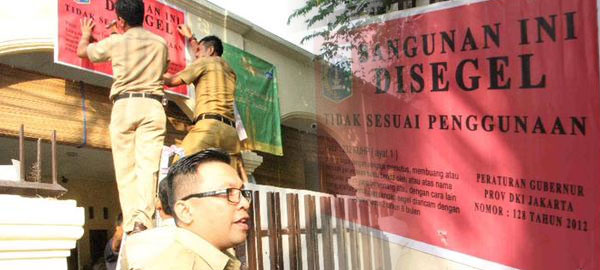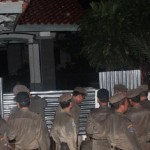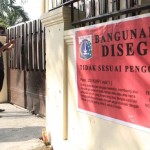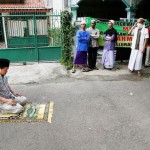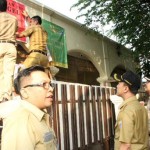Officials from the South Jakarta administration and the municipality’s Public Order Agency (Satpol PP) sealed the An Nur Ahmadiyya mosque in Bukit Duri Tanjakan, Tebet, on Wednesday morning, affixing a red banner that stated the mosque had been officially sealed by the Jakarta administration.
The closure follows a June 12 incident in which a crowd of locals blocked the Ahmadis from performing their Friday prayers at the mosque, forcing them to fulfill their religious obligations in the street.
Tri, a local Islamic preacher who was present that day, said he and other local residents had repeatedly protested to various municipal officials about the presence of the mosque.
“Today, we finally saw the result of our efforts to report [the Ahmadis] to local officials,” Tri told the media.
He claimed that a majority of residents in the area had for years opposed the presence of the Ahmadiyya community in their neighborhood and objected to the presence of the mosque.
“It is a private house, but they use it to perform Friday prayers,” Tri said, adding that he deemed the
Ahmadis guilty of heresy.
The closure of the Ahmadiyya mosque is the latest in a series of incidents across the country in which religious minorities have faced harassment from hard-line Islamic groups, but a rare event in Jakarta. “This is a slap in the face of Jakarta’s local government as the city is supposed to be cosmopolitan and pluralistic,” rights group Setara Institute’s director Bonar Naipospos told Reuters.
South Jakarta Spatial Planning Agency head Syukria said that the mosque had been closed as it violated a number of bylaws on building management and spatial planning.
The Ahmadiyya Muslim Community, meanwhile, questioned the South Jakarta municipality’s action, claiming to have received no detailed explanation of the legal basis for the closure of their mosque.
“They should have explained which of our activities are viewed as having violated those regulations,” said Yendra, a member of the Ahmadiyya community.
The Ahmadis, Yenda said, had been conducting religious activities at the mosque since the 1970s without receiving any complaints until the protest last month.
“The municipality acted against us because they were under pressure from intolerant groups,” Yendra said.
A number of personnel from Tebet Police were also present at the closure. Tebet Police chief comr. I Ketut Sudarma said the move was necessary to uphold public order in the area and prevent escalation of the prolonged spat between Ahmadis and residents.
A senior police official this week admitted officers were often too scared for their own safety to take on religious hardliners, media reported.
The Indonesian Ulema Council (MUI), which once issued an edict declaring the Ahmadis heretics, has repeatedly urged the government to ban the Ahmadiyya sect because it deviates from the teachings of mainstream Sunni Islam.
In February 2011, in a village in Banten province on Java island, 21 members of the Ahmadiyya sect were attacked by more than 1,000 villagers while police officers stood by. That same week, Islamic hardliners set two churches on fire in central Java to protest against what they considered a lenient sentence for a Christian convicted of blaspheming Islam.

